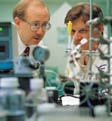 Searching
for new solutions The research team works primarily with two mouse antibodies: the Lym-1, which has been used in radioimmuno- therapy research into lymphoma for about a decade, and the newer M170 antibody, which is being tested in patients with advanced, intractable breast and prostate cancers. The researchers first tag the antibody with the radioactive isotope Iridium-111, which beams out gamma rays that are seen on a special scanner that allows scientists to determine whether the antibody is distributed throughout the body. If distribution is adequate, they inject a second dose of the antibody, this time tagged with the stronger radioactive atom Yttrium-90, which is strong enough to kill cancer cells. The sensitivity of the cancer to radioimmunotherapy varies from patient to patient and from cancer to cancer, according to O'Donnell, who earned his M.D. at the Stritch School of Medicine at Loyola University. "Some patients will have a form of cancer that is more or less sensitive to the radiation, just like some have different sensitivities to chemotherapy," said O'Donnell, who holds University of California and Cancer Research Institute grants and participates in a National Institutes of Health grants to investigate radioimmuno- therapy.
Home |
Table of Contents |
To our Readers |
Building on Basics UC Davis Health System | © 2000, 2001, 2002 UC Regents. All rights reserved. |
Radioimmuno- |

